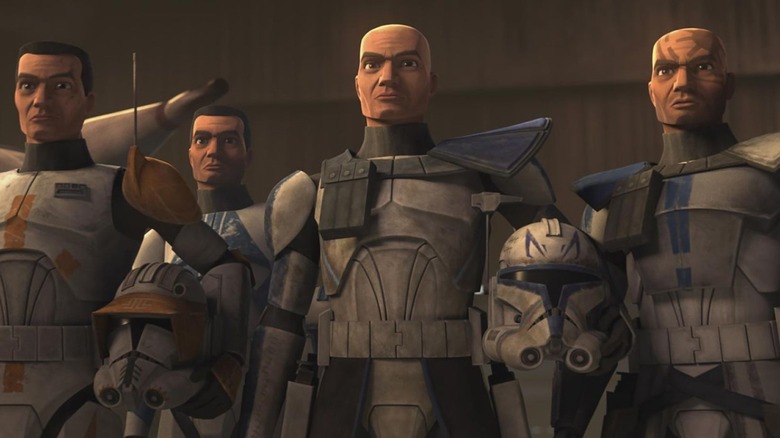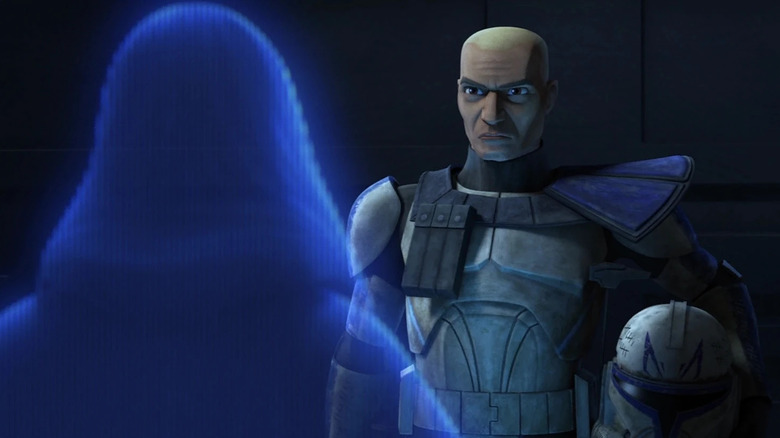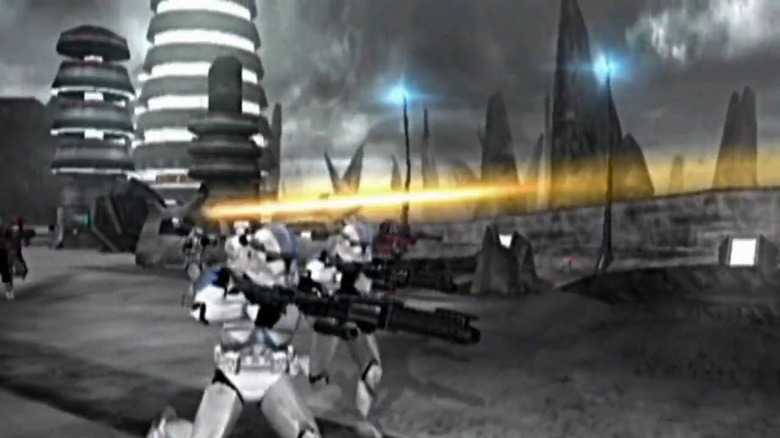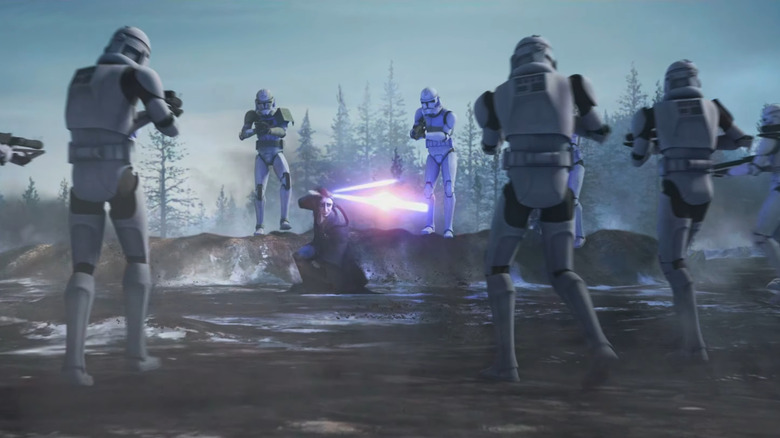Star Wars: The Clone Wars' Controversial Change To Order 66 Explained
Almost 20 years later, Order 66 — where all the Jedi were suddenly labeled as traitors and thus subject to execution — remains one of the biggest moments of all of "Star Wars" (and also one of its best, as selected by us). Since the very first "Star Wars" film we'd heard about the Jedi being hunted down — but when it finally happened, it was worse than fans could have imagined.
It is a tragic and harrowing scene that shows several Jedi killed, not by Vader himself or some formidable Sith enemy, but by the very soldiers the Jedi fought alongside. It remains one of the coolest things George Lucas has ever done, and a scene that only got better and more tragic as "The Clone Wars" expanded the relationship between Jedi and clone trooper during the war.
We saw the two groups bond throughout the war, becoming not just allies, but friends. This is particularly true of Anakin, Obi-Wan, and Ahsoka's squads. The idea that these clones regarded the Jedi not as only generals and superiors, but as heroes and friends made the eventual betrayal and genocide all the more tragic.
As the seasons of "The Clone Wars" went on, and the show became darker and more mature, the question of whether we'd get to see Order 66 explored in some way on "The Clone Wars" became more pressing. Not only did we get to see Order 66 play out from Ahsoka's point of view — another incredible sequence — but the show added to the lore of Order 66 by also making it a "Manchurian Candidate" scenario. The retcon remains one of the most controversial things Dave Filoni and his team did with "The Clone Wars."
Execute Order... Inhibitor Chip?
The big reveal happens in season 6, which was dumped on Netflix after an unceremonious cancelation. Clone Trooper Fives discovers that every single clone has an inhibitor chip planted during embryonic development. The Kaminoan say these are biochips meant to limit aggression in clone troopers. In reality, however, they turned the clones into a slave army, millions of sleeper agents completely unable to disobey any orders — like killing all the Jedi.
Speaking with Rebel Force Radio, Dave Filoni explained the reasoning behind the controversial retcon. As with much of "The Clone Wars," the core of the idea came from George Lucas himself and implicit seeds planted in the movies. As Filoni points out, in "Attack of the Clones" we do hear straight from the Kaminoans that "The clones had been engineered to be more docile," which opens up the idea of the chips.
Ultimately, it seems the retcon, like many other things Lucas did in "The Clone Wars" — like bringing Maul back — came down to him just thinking it sounded cool. Here, it is all about that "Manchurian Candidate" idea. Given how "Attack of the Clones" is in a way a big conspiracy thriller movie, with Obi-Wan looking into a web of lies and deception, it makes sense that there would be a homage to a classic.
This proved to be rather controversial. It removed any agency from the clones, and all but made them completely innocent in the Jedi Purge. Before that, several works like the junior novelization of "Revenge of the Sith" and the "Republic Commando" novel series explored the idea of Order 66 being part of several orders the clones were already familiar with for cases of emergency. Possibly the best portrayal of this take lies in the 2005 "Star Wars: Battlefront II" game.
Good soldiers follow orders
The single-player campaign for that game is told as an autobiographical account of the war from the point of view of a clone veteran who fought with the 501st Legion (Anakin's main legion we see throughout "The Clone Wars," which Fives served in).
The game makes it clear early on that the clones were all fully aware of Order 66, even before it was officially given. Maybe they knew it was a possibility if the Jedi betrayed the Republic, or maybe they were aware of Palpatine's grand plan and just bonded with the Jedi to make the ruse believable. Regardless, when the Purge happened, they were conscious and willing participants.
Hearing the narration before every mission — delivered by Temuera Morrison — is harrowing. Take a mission to Felucia right before the order was given. The narrator says that as they finished the mission and left the planet, Jedi Aayla Secura saw the platoon off personally and called them all brave. "It's a good thing we were wearing helmets," the clone narrator says. "Because none of us could bear to look her in the eye."
This is something even "The Clone Wars" carried over. In the final season, when Rex desperately tries to fight off the order to avoid executing Ahsoka, he is crying under his helmet.
If only...
That game includes a mission of the player joining Anakin in assaulting the Jedi Temple and massacring the Jedi there (no younglings, though). The narration for that mission shows that the clones acted out of loyalty, rather than some forced programming. "We all knew what was about to happen, what we were about to do," the narration says. "Did we have any doubts? Any private traitorous thoughts? Perhaps, but no one said a word."
This is what makes the two approaches different. Having the clones be conflicted adds to Lucas' vision of the prequels as a story about the rise of a fascist state with devoted fanatics. The clones, no matter how good they seemed, ended up betraying their friends and comrades because they followed orders. "The Clone Wars" tried to retain some of that by having the inhibitor chip also trigger a code phrase in the clones as they carried on Order 66 — "Good soldiers follow orders." By making them docile programmed slaves, however, the franchise takes a tamer approach. Granted, given the young demographic of the show and how liked the clones were, avoiding making them cold killers makes sense.
As Filoni said, there was another point to the inhibitor chip in addition to simply explaining where Order 66 came from: "It was also about showing that not everything that Palpatine did was flawless, that there were near misses, that there were opportunities to stop it." That is the ultimate thesis of the prequels, particularly "The Clone Wars." Everything could have been avoided if only someone had done a few things differently. If only Obi-Wan had taken Count Dooku's warning seriously in "Attack of the Clones." Or if Shaak Ti had listened to Fives. Maybe it could have all been avoided.



